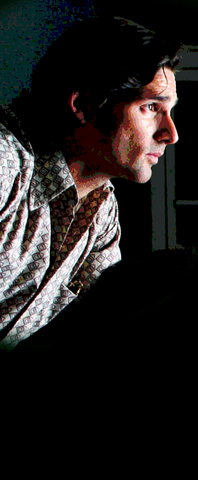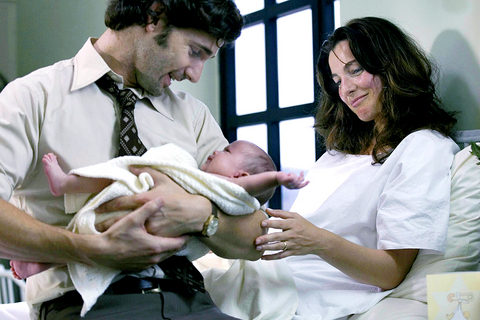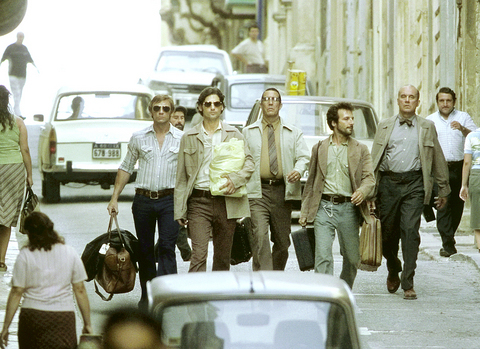With his latest film, Munich, Steven Spielberg forgoes the emotional bullying and pop thrills that come so easily to him to tell the story of a campaign of vengeance that Israel purportedly brought against Palestinian terrorists in the wake of the 1972 Olympics. An unsparingly brutal look at two peoples all but drowning in a sea of their own blood, Munich is by far the toughest film of the director's career and the most anguished. Spielberg has been pummeling audiences with his virtuosity for nearly as long as he has been making movies; now, he tenders an invitation to a discussion.
The film's title suggests that this is the story of what happened at Munich in September 1972, and it is, though only in part. Most of the action -- and if nothing else, this nail-biter is a full-on action movie -- takes place in the immediate aftermath of Munich, after 11 Israeli hostages were murdered by members of a Palestinian terrorist group known as Black September. Based on George Jonas' disputed book Vengeance: The True Story of an Israeli Counter-Terrorist Team, and adapted to the screen by the oddball couple of Eric Roth and Tony Kushner (Forrest Gump meets Angels in America), the film pivots on five Israeli agents, who, recruited to exact revenge by a country that will officially deny their existence, zigzag Europe as they hunt suspects over months and then years.
With its art-directed verisimi-litude and promiscuous use of archival material (Jim McKay makes a cameo appearance in the film, as does the voice of Peter Jennings) Munich is one of those Hollywood fictions that seem to befuddle those who miss the nuance in the words "inspired by real events." Here, those events begin with members of Black September scaling the Olympic village fence and taking both Israeli athletes and coaches hostage. Most of what happens next, including the agonizing wait at the Olympic village and the catastrophic showdown, emerges piecemeal, in bursts of violence that periodically interrupt the narrative and increasingly trouble the sleep of the story's quavering moral center, a former Mossad agent named Avner (the Australian actor Eric Bana).

For Black September, Munich is both a theater of cruelty and a means to international visibility. For the Israeli Prime Minister Golda Meir (Lynn Cohen), who personally presses Avner into vengeance, Munich is more than the scene of a crime: it is a reminder, a warning, a defensive call to arms. It is also why, with Meir's blessing, instructions from a Mossad case officer (Geoffrey Rush) and hundreds of thousands of US dollars tucked in a Swiss bank, Avner leaves Jerusalem and his wife and travels to Europe. There, he meets with his team members, any one of whom could star in his own espionage potboiler: the sexy South African in tight pants, Steve (Daniel Craig), the tweedy, pipe-smoking Israeli, Carl (Ciaran Hinds), the smoothly urbane German antiques dealer, Hans (Hanns Zischler) and the nebbishy Belgian toy and bomb maker, Robert (Mathieu Kassovitz).
Despite the brief pop-cultural dissonance brought on by the sight of the Incredible Hulk, whom Bana played in the 2003 blockbuster, sharing the screen with the new James Bond (Craig) and HBO's Julius Caesar (Hinds), the actors quickly make these character types their own. The missions happen just as quickly, if not without incident. In Rome, the team tracks a Palestinian intellectual who has just translated Scheherazade (which, in a Kushner-sounding touch, the translator describes as a "narrative of survival") and may have terrorist connections. When the moment comes for Avner to face his prey, an older man with trembling hands, the agent fumbles his gun. Later in Paris, in a sequence that finds Spielberg outdoing Hitchcock with bravura crosscutting, Avner again nearly botches the job, putting his team and an innocent bystander in danger.
If Bana sometimes seems overly sensitive for an undercover agent it's largely because without his anxious eyes and jittery hands Avner would not be half as sympathetic or rhetorically effective. What makes Avner memorable, more than just an unusually animated action figure, is that he is never more human than when faced with killing another person. More than the story's slow-to-dawn ambivalence about Avner's mission, more than the obvious effort made to ensure that the Palestinian terrorists are more than faceless thugs (they are thugs with faces and speeches), it is Avner's humanity, however compromised, that gives Munich the weight of a moral argument. It's an argument, though, that has little to do with whether Israel has a right to exist or whether the Palestinians have the right of return. Only this matters: blood has its costs, even blood shed in righteous defense.

PHOTO COURTESY OF FOX MOVIES
Munich is as much a meditation on ethics as a political thriller, but it takes nothing away from the film to say that the most adrenaline-spiked part of this genre hybrid involves getaway cars, false papers and the sight of the future Israeli Prime Minister Ehud Barak, who pops up during a mission in Lebanon, mowing down terrorists while dressed in a woman's wig and high heels. In between the cloak, dagger and drag, the telephone bombs and a veritable alphabet soup of intrigue (CIA, PLO, KGB), the years pass with increasing desperation and the team's numbers dwindle. Forced into a new kind of exodus, far from the homeland meant to provide justification for their every action, Avner and his men wander the continent that three decades earlier had been the staging ground for the extermination of European Jewry.
For these wandering, bickering, argumentative Jews, every safe house and port of call becomes an occasion for yet another discussion about Israel and identity. Nothing if not conversational, Munich is organized around three crucial dialogues: Meir's discussion of vengeance with her advisers, which ends with her declaration that every civilization finds it necessary to negotiate compromises with its own values; a brief discussion between Avner and a Palestinian who predicts Israel's defeat; and, finally, a bitter encounter between two Israelis who fail to find common ground even in that multicultural utopia known as Brooklyn. With its dead-eye view of Lower Manhattan and the twin towers, this scene makes clear (as if there was any doubt) that Spielberg is as worried about this country as he is about Israel.
As his tours of duty with the historian Stephen Ambrose suggested (Saving Private Ryan, Band of Brothers), Spielberg can give the appearance of wanting to be seen as more than just a Hollywood director, particularly since he added "adult contemp-orary" to his playlist, mixing history in with his dinosaurs. That makes him a soft target, and Munich has already been strafed by op-ed attacks. The accusations might make sense if the filmmaker took us into the terrorists' homes for some moral relativism. But Spielberg is doing nothing more radical here than advancing the idea that dialogue ends when two enemies, held hostage by dusty history and hot blood, have their hands locked around each other's throats. You can't hold your children with your hands so occupied, though evidently you can send them off to war.

PHOTO COURTESY OF FOX MOVIES
It would do a disservice to Spielberg to linger too long on the pre-emptive attacks on the film: more than anything, Munich is a slammin' entertainment filled with dazzling set pieces and geometric camerawork. Different palettes help keep the narrative flowing,
imparting a contrasting vibe to each landscape: the bleached-out Israeli exteriors are as faded as old family photographs, while the verdant French countryside where Avner meets a mysterious intelligence broker called Papa (Michael Lonsdale) has the seductive tug of an idyll. This pocket of green and Old World civility, embellished from Jonas's book, is the film's shrewdest and most entertaining conceit: a movie within a movie, it is a vision of evil as both seductive romance and bureaucratic banality.
Avner meets Papa through his son, Louis, a dandy with a German shepherd and a sneer played by the French actor Mathieu Amalric. Their organization supplies information for fantastic sums but insists on never doing business with governments, a philosophy that Papa explains during one al fresco meal at his compound. Nestled in haute-bourgeois luxury, surrounded by children and barking dogs, this self-described hero of the Maquis proclaims himself an equal-opportunity hater of all governments. Next to this weary sophisticate, with his blood sausages and free-market nihilism, Avner comes off as a punk, an amateur. But Avner is also an idealist and, unlike Papa, who believes in only his family and money, the Israeli clings to a dream of home. And if that dream remains out of reach, well, Spielberg asks, what other choice does he have?

The canonical shot of an East Asian city is a night skyline studded with towering apartment and office buildings, bright with neon and plastic signage, a landscape of energy and modernity. Another classic image is the same city seen from above, in which identical apartment towers march across the city, spilling out over nearby geography, like stylized soldiers colonizing new territory in a board game. Densely populated dynamic conurbations of money, technological innovation and convenience, it is hard to see the cities of East Asia as what they truly are: necropolises. Why is this? The East Asian development model, with

June 16 to June 22 The following flyer appeared on the streets of Hsinchu on June 12, 1895: “Taipei has already fallen to the Japanese barbarians, who have brought great misery to our land and people. We heard that the Japanese occupiers will tax our gardens, our houses, our bodies, and even our chickens, dogs, cows and pigs. They wear their hair wild, carve their teeth, tattoo their foreheads, wear strange clothes and speak a strange language. How can we be ruled by such people?” Posted by civilian militia leader Wu Tang-hsing (吳湯興), it was a call to arms to retake

This is a deeply unsettling period in Taiwan. Uncertainties are everywhere while everyone waits for a small army of other shoes to drop on nearly every front. During challenging times, interesting political changes can happen, yet all three major political parties are beset with scandals, strife and self-inflicted wounds. As the ruling party, the Democratic Progressive Party (DPP) is held accountable for not only the challenges to the party, but also the nation. Taiwan is geopolitically and economically under threat. Domestically, the administration is under siege by the opposition-controlled legislature and growing discontent with what opponents characterize as arrogant, autocratic

When Lisa, 20, laces into her ultra-high heels for her shift at a strip club in Ukraine’s Kharkiv, she knows that aside from dancing, she will have to comfort traumatized soldiers. Since Russia’s 2022 invasion, exhausted troops are the main clientele of the Flash Dancers club in the center of the northeastern city, just 20 kilometers from Russian forces. For some customers, it provides an “escape” from the war, said Valerya Zavatska — a 25-year-old law graduate who runs the club with her mother, an ex-dancer. But many are not there just for the show. They “want to talk about what hurts,” she